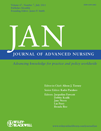Effects of an osteoarthritis self-management programme
Abstract
wu s.-f.v., kao m.-j., wu m.-p., tsai m.-w. & chang w.-w. (2011) Effects of an osteoarthritis self-management programme. Journal of Advanced Nursing67(7), 1491–1501.
Aim. The aim of this study was to assess the effectiveness of a self-management programme among osteoarthritis knee sufferers.
Background. Osteoarthritis of the knee is a major cause of loss of function and is common in the older people. A self-management programme is an effective way to increase arthritis self-efficacy, and helps with mastering self-management practices.
Method. This study was carried out from January 2008 to December 2008 and included 205 participants, with 114 in the intervention group and 91 in the control group. The 4-week trial was followed by an 8-week follow-up assessment. The outcome measures included assessments of arthritis self-efficacy, pain beliefs, unplanned medical consultations, pain days and disability days using the Mann–Whitney U-test and Friedman test.
Findings. At post-intervention, significant differences were found in pain beliefs (P < 0·001) and pain days (P < 0·004). At 8-week follow-up, there was a significant improvement in arthritis self-efficacy: pain and other symptoms subscales (P < 0·001 and 0·049, respectively), pain beliefs (P < 0·001) and number of unplanned medical consultations (P < 0·010).
Conclusion. The study supports the hypothesis that a self-management programme enhances arthritis-related self-efficacy and pain beliefs. A decrease in the number of unplanned medical consultations, pain days and disability days suggests that the programme might help reduce healthcare costs. This programme has introduced a significant result about self-efficacy and self-management to a chronic disease population in Taiwan. In short, there were great beneficial effects on self-management among persons who are affected by knee osteoarthritis.




